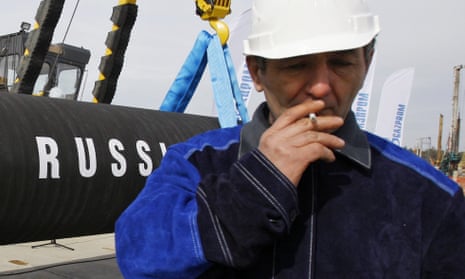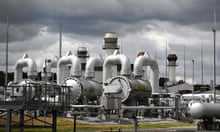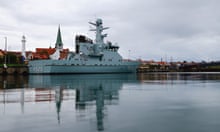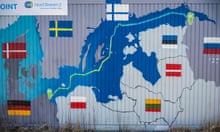Russia has stopped the flow of gas via the Nord Stream 1 pipeline to Europe, citing the need to carry out repairs, in a move that has heightened already acute nervousness over the reliability of winter energy supplies.
The halt on the Baltic Sea pipeline at 5am on Wednesday would last for three days, Gazprom, the Russian state energy company said. It had warned two weeks ago that the outage was due but the German government said it had not been formally told, receiving the information instead via social media after it was posted on Gazprom’s Telegram channel.
In recent months, the gas flow had been reduced to 40% of expected levels. In July, the flow was stopped for scheduled maintenance and resumed again after 10 days but at only 20% of capacity, with Moscow blaming the failure of Germany to return vital equipment due to sanctions imposed on Russia.
The German government rejects the claim, calling it a “pretence”. It said Nord Stream was “fully operational” and that there were no technical issues.
Since invading Ukraine, Russia has cut off gas supply to Bulgaria, Denmark, Finland, the Netherlands and Poland completely, and reduced flows via other pipelines.
On Wednesday morning, Russia accused the German government of doing everything it could to destroy its energy relations with Moscow. A foreign ministry spokesperson, Maria Zakharova, said Germany was to blame for “attempting to completely fracture” the energy bond between the two countries.
Germany is in a race against time to do exactly that, having already decreased its dependency on Russian gas from about 55% in February to about 26% at present by reducing usage and finding alternative import sources. But it is not expected to be completely independent from Russian gas until the middle of 2024.
Klaus Müller, the head of Germany’s network regulator, Bundesnetzagentur, said Europe’s largest economy was ahead of its own target to fill gas storage facilities across the country, which were just over 83% full on Tuesday. The target is for 85% by 1 October. But a 95% target is expected to be reached only if industries and households make cuts of about 15%.
The “heating season”, which usually starts around mid-September, is seen as a crunch time for Germany’s energy supply plans as from then on the stored gas will be needed and levels will drop. A colder winter and further stops to supply from Russia could complicate the situation.
after newsletter promotion
Supplies are also coming from Norway, the Netherlands and Belgium. The three-day stop is expected to amount to just over a terawatt hour of gas. But the supplies coming from non-Russian sources over the same period amount to about 8TWh.
Germany is banking on the fact that it would not be in the interests of the Russian president, Vladimir Putin, to stop the gas deliveries altogether, as it would lose the Russian economy not only a lot of money but also significant leverage.
The Kremlin spokesperson Dmitry Peskov said Russia would meet its obligations and rejected the claims from Berlin that the stoppage was politically motivated.
A significant redirection of gas supplies from Russia that are no longer going to Europe is not considered possible because pipelines in that direction are few and far between.
China is buying only a fraction of exports going towards Europe, which is believed to be the reason behind the decision by Russia to burn off huge quantities of gas in recent days.
Meanwhile, sales of water and energy-saving shower heads, electric blankets and camping gas cookers have soared in recent weeks as Germans look to reduce their gas usage and control soaring utility bills.









